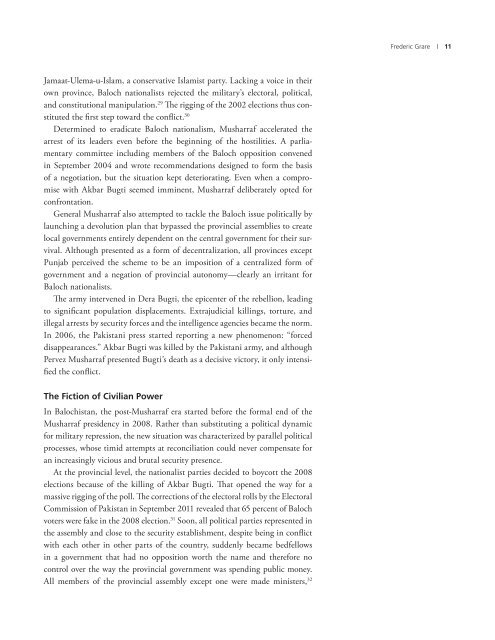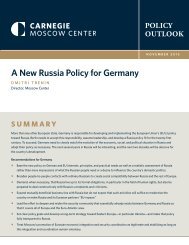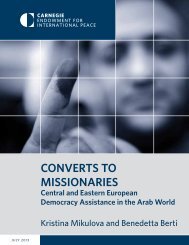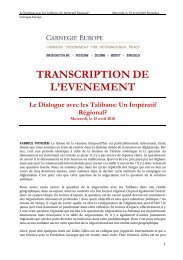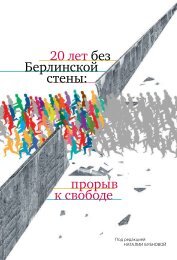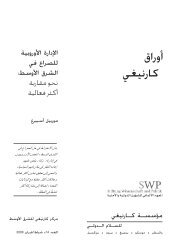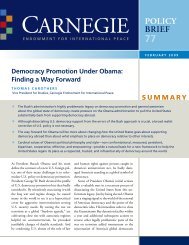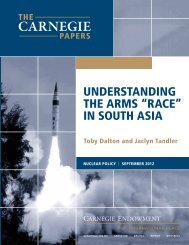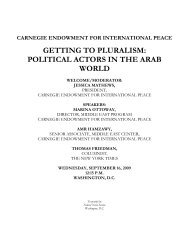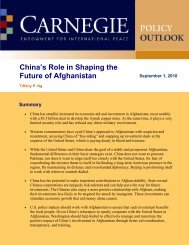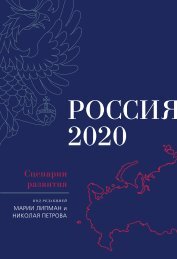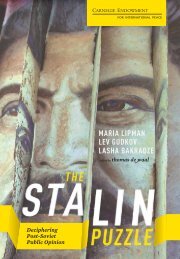BALOCHISTAN - Carnegie Endowment for International Peace
BALOCHISTAN - Carnegie Endowment for International Peace
BALOCHISTAN - Carnegie Endowment for International Peace
You also want an ePaper? Increase the reach of your titles
YUMPU automatically turns print PDFs into web optimized ePapers that Google loves.
Jamaat-Ulema-u-Islam, a conservative Islamist party. Lacking a voice in their<br />
own province, Baloch nationalists rejected the military’s electoral, political,<br />
and constitutional manipulation. 29 The rigging of the 2002 elections thus constituted<br />
the first step toward the conflict. 30<br />
Determined to eradicate Baloch nationalism, Musharraf accelerated the<br />
arrest of its leaders even be<strong>for</strong>e the beginning of the hostilities. A parliamentary<br />
committee including members of the Baloch opposition convened<br />
in September 2004 and wrote recommendations designed to <strong>for</strong>m the basis<br />
of a negotiation, but the situation kept deteriorating. Even when a compromise<br />
with Akbar Bugti seemed imminent, Musharraf deliberately opted <strong>for</strong><br />
confrontation.<br />
General Musharraf also attempted to tackle the Baloch issue politically by<br />
launching a devolution plan that bypassed the provincial assemblies to create<br />
local governments entirely dependent on the central government <strong>for</strong> their survival.<br />
Although presented as a <strong>for</strong>m of decentralization, all provinces except<br />
Punjab perceived the scheme to be an imposition of a centralized <strong>for</strong>m of<br />
government and a negation of provincial autonomy—clearly an irritant <strong>for</strong><br />
Baloch nationalists.<br />
The army intervened in Dera Bugti, the epicenter of the rebellion, leading<br />
to significant population displacements. Extrajudicial killings, torture, and<br />
illegal arrests by security <strong>for</strong>ces and the intelligence agencies became the norm.<br />
In 2006, the Pakistani press started reporting a new phenomenon: “<strong>for</strong>ced<br />
disappearances.” Akbar Bugti was killed by the Pakistani army, and although<br />
Pervez Musharraf presented Bugti’s death as a decisive victory, it only intensified<br />
the conflict.<br />
The Fiction of Civilian Power<br />
In Balochistan, the post-Musharraf era started be<strong>for</strong>e the <strong>for</strong>mal end of the<br />
Musharraf presidency in 2008. Rather than substituting a political dynamic<br />
<strong>for</strong> military repression, the new situation was characterized by parallel political<br />
processes, whose timid attempts at reconciliation could never compensate <strong>for</strong><br />
an increasingly vicious and brutal security presence.<br />
At the provincial level, the nationalist parties decided to boycott the 2008<br />
elections because of the killing of Akbar Bugti. That opened the way <strong>for</strong> a<br />
massive rigging of the poll. The corrections of the electoral rolls by the Electoral<br />
Commission of Pakistan in September 2011 revealed that 65 percent of Baloch<br />
voters were fake in the 2008 election. 31 Soon, all political parties represented in<br />
the assembly and close to the security establishment, despite being in conflict<br />
with each other in other parts of the country, suddenly became bedfellows<br />
in a government that had no opposition worth the name and there<strong>for</strong>e no<br />
control over the way the provincial government was spending public money.<br />
All members of the provincial assembly except one were made ministers, 32<br />
Frederic Grare | 11


